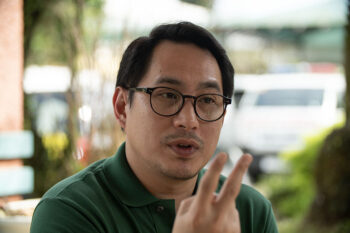MANILA (MindaNews/14 Sept) — In New York, a memorial service was held on ‘ground zero’ for the victims who perished in the 9/11 terrorist attacks ten years ago. Elsewhere in the world, the tragic incident was remembered not only by those who lost loved ones and friends in the rubble, but also by those whose sense of humanity and compassion have kept the memory alive and near.
It was a day of stark images that revealed both the darkness of anger, hatred and fear lurking in the human heart and the light of hope, faith and love in the triumph of the human spirit. For those blessed with lives sheltered from such stark realities, the image of planes crashing and buildings crumbling may be horrifying or surreal, like footages from a Hollywood movie. But for those who live in the midst of conflict and war, and bear witness to violence happening around them on a daily basis, the images are painfully real and the crying need for security and justice interminable.
Here in the Philippines, there is this struggle that has been going on for decades, a struggle that has given rise to outbreaks of violence in the southern region of Mindanao, the part of the country that was once known as the ‘fruit basket of the Philippines’. It is the struggle of Muslims for their right to self-determination in a country that is predominantly Christian.
I was born and raised in Mindanao and although I have left my southern homeland over three decades ago, news of the ongoing conflict there and the sporadic outbreaks of violence that punctuated it at every turn these past many years have provoked in me feelings of helplessness and restlessness inside. I am not Muslim, I am Christian. But surely, I thought, there must be something I can do for Mindanao—no matter how small–from here where I am?
I learned soon enough that seeking answers to such a question was a journey that took me out of my comfort zone to difficult places within myself where I had to take risks, where I had to make choices and sacrifices that did not come easy. It called for a certain response-ability.
Response-ability, as the term suggests, is the ability of a person to respond to any given stimulus. I realized later, as I began to engage in the endeavor of reaching out and building relationships of mutual respect, understanding and cooperation between and among people of different cultures and beliefs in Metro Manila—especially between Muslims and Christians in grassroots communities here—that a person’s ability to respond calls for sense organs of the soul that, when developed to a certain degree, enable the person to make choices which are pro-active, life-giving and healing. In my experience, there are at least three soul senses essential to response-ability: the sense of sight, hearing, and movement.
The sense of sight enables us to see wholeness in the midst of brokenness, to see fragments and parts while appreciating the whole, to visualize or imagine what can be possible in the midst of what seems to be impossible; to think out of the box. It is the one that enables visionaries to plow through even in the midst of chaos and confusion to a place where they would like themselves and their people to be, and to revisit the past to find a compass for blazing new trails for the future. This sense of sight is essential to the process of change for it gives us a sense of direction, a sense of where we are going. Without being able to see, then what change can we possibly bring about that we wish would come to be?
The sense of hearing is essential too, and this means not only hearing with our ears but with our heart rightly. This sense enables us to receive what is really being said in the silences beneath the noise of our anger and fears, or hear the truth that is being conveyed behind the seeming harshness of the other person’s words, and know in the deepest level of our being that despite our differences, we are one and connected at heart, and in our heart we speak the same language.
And then there is the sense of movement without which no transformative change is possible. In response-ability, it is not enough to see what needs to be changed, or to hear the truth underlying the need. Change happens when the threefold process of thinking-feeling-being come together in an integrity of co-creative action unfolding from one present moment to the next.
Response-ability varies in degree of intensity from one person to another. But what this usually gives rise to is depth of conviction and the warmth of passion that compels a person to engage in collaborative action towards transformative change.
In this awareness I realized that one does not have to be in Mindanao to support the people of Mindanao or be in solidarity with them. I have humbly endeavored to respond (with the best of my ability) to what I perceived was a need for Muslim-Christian peace- and relationship-building by promoting various forms of dialogue in Metro Manila these past twelve years.
A few days ago, however, I had the chance to return to Mindanao again to attend the 2nd National Solidarity Conference on Mindanao that was held in Davao City last September 8 and 9. It was convened by the Bishops-Ulama Conference, Mindanao Solidarity Network, Philippine Council of Evangelical Churches, International Alert, Consortium of Bangsamoro Civil Society, and the Mindanao People’s Caucus. Its theme was: GPH-MILF Peace Talks: Finding a Common Ground, and it aimed to help the members of the peace negotiating panels of the Government of the Republic of the Philippines (GPH) and the Moro Islamic Liberation Front (MILF) move forward in their talks toward reaching a final peace agreement.
However, after having heard members of both panels speak, I could not help but feel saddened by a sense that the common ground we seek seemed not to be anywhere in sight given not only the differences in positions of the two parties, but also what seems to be fundamental differences in perspectives, attitudes, interests, values and underlying needs that seem to traverse on parallel lines and never intersect.
The MILF position has been categorically stated and is steadfastly held. To be a true and trustworthy counterpart to this dialogue of negotiations, perhaps the Philippine government needs to see itself and its dialogue counterpart in a new light. I do not claim to be an expert in these high level negotiations, but as an aspiring peacemaker listening to the voices of the Muslims, Christians and indigenous peoples of Mindanao at the Davao conference, I heard a few things concerning what needs to be addressed in order to arrive at a common ground for peace in Mindanao. I humbly share here some highlights of what I heard, for whatever they may be worth–
- There is a need on the part of government to come across as not only being concerned with protecting its sovereignty but also as being steadfast and sincere in its desire to listen to and proactively address the needs of the Bangsamoro people. It does not help the process if this administration comes across as though it is playing a game of cards and is holding its aces close to its chest with the intent to win the game against its opponents, or earn the approval of its supporters.
- There is a need to honor past agreements and to lay the groundworks for establishing mechanisms (in the judiciary, legislative and executive branches of government) that would support and safeguard those agreements in a sustainable way; and also to find creative, bold and respectful approaches to addressing differences so that both panels can move forward together towards seeking win-win solutions to shared problems.
- Both sides of the panel need also to consider and respect other positions such as those of the indigenous peoples whose lives are rooted also in Mindanao.
- Active participation of civil society in the peace negotiation process needs to be engaged. Civil society can serve as a THIRD FORCE that will hold together the differences between the GPH and MILF positions and provide a “safe space” and a container for them. There were suggestions for the creation of a Civil Society Coalition, and the conduct of nationwide community dialogues in order to inspire and encourage civil society involvement in the process, and promote public awareness and education on issues of concern.
- The need to address issues of security is real and urgent. While high-level talks are being conducted, government must take measures to protect the safety and wellbeing of civilians on the ground who usually get caught in the crossfire and have to flee their homes whenever the ‘peace talks’ fail (or are perceived to fail), and outbreaks of violence resume.
Around a hundred participants from various civil society organizations (with representatives from media and international aid organizations) sat patiently together for two days to listen and discuss ways of finding that place between “heaven” and “earth” where the two panels could meet and arrive at a final agreement on the Bangsamoro issues. While the GPH panel came across as articulate and intellectual, there was a sense that it needed to be more sensitive and less defensive in its efforts at reaching out to and understanding the needs that underlie the steadfast position of the MILF and its people.
I could not help but hear the anguished voice of Datu Michael Mastura, a passionate member of the MILF panel, moaning in frustration before a Metro Manila audience some months ago, “When will you take us seriously?” Somehow the brilliant, albeit loquacious, presentation of GPH Chair Dean Marvic Leonen failed to move me with a positive answer to that. Instead, I was struck by what Atty. Naguib Sinarimbo, Executive Secretary of the Autonomous Region of Muslim Mindanao (ARMM) said in his presentation at the conference that afternoon. He reiterated the words of (Cotabato Archbishop Orlando) Quevedo saying that injustice is the real issue underlying the Bangsamoro problem, beyond poverty and the problem of development. He added that unless the problem is addressed, efforts at addressing poverty and development issues would come to naught. It takes much time, energy and resources to construct a building, but it takes only a matter of seconds to burn it down, he analogized.
In New York ten years ago on 9/11, the twin towers of the World Trade Center crumbled into a pile of rubble and 2,983 lives were lost in its wake. In Mindanao, over 500,000 people have fled their homes during the outbreaks of violence that happened these past many years. Many thousands of lives have been lost. Yet they who live there–the tri-people who call Mindanao their homeland–carry on with their lives, hoping against hope that the time will come when the fighting would end, and they would return to their homes with their children, and rebuild their lives with new hope, and without fear. (MindaViews is the opinion section of MindaNews. PeaceTalk is open to anyone who wishes to share his/her piece on peace in Mindanao. Marites Guingona-Africa is Founder and Executive Director of The Peacemakers’ Circle Foundation, Inc., a Manila-based interfaith organization composed of members of diverse religions, spiritual expressions and indigenous traditions working together to promote mutual respect, understanding and cooperation. This piece is from her blog, http://maritesafrica.multiply.com/)







